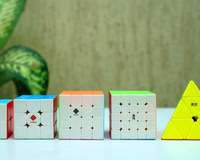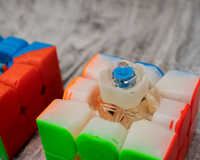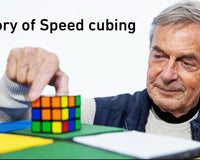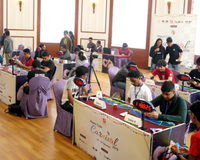Hi, I’m Kunal Oak, a three-time 7x7 National Record Holder, defending 7x7 National Champion and a speedcubing coach. In this blog, I shall discuss my philosophy for improving at 6x6 and 7x7, my main events, along with common mistakes a lot of beginners make along the way.
Hardware
It goes without saying that good hardware is of paramount importance, especially on big cubes. On 3x3, you might average the same on a flagship and a budget cube, and the cube you choose as your main ultimately boils down to preference in terms of feel. However, for big cubes, I consider it absolutely essential to have good hardware - invest in good flagships, and it will last you a long time. Do keep in mind that depending on when you read this blog, the cubes I recommend might be obsolete and there might be better cubes on the market, since big cube hardware still has a lot of room to grow. However, at the time of writing this blog, my main recommendations are the YJ MGC 6x6 and 7x7. These are both very reasonably priced cubes compared to other flagships, and I use both of these as my mains.
Turning
Turning is probably the steepest learning curve you will encounter. Not only are larger cubes harder to turn, but the hardware is also not on par with smaller cubes and is much less forgiving. Turning speed will help you to get ahead the competition. You can learn finger tricks to gear up your turning speed. The good news is, this is also why beginners see rapid improvement compared to other events when they initially start big cubes.

While good turning is something that takes a lot of time to develop, your times will initially rapidly drop just from practicing a lot. You can even see the rapid drop in my official times from my WCA profile.
Efficiency
Even though efficiency is what I would consider my strongest point in big cubes, this is probably the biggest sore point for a lot of solvers, even after they get fast. The fact of the matter is, it is far more difficult to have good efficiency on big cubes as compared to smaller NxNs. The best way to improve upon this part of your solves is to simply spend several minutes a day just experimenting with different solutions, particularly for centers. Also, it helps to watch walkthroughs from world class solvers, since all of them have at least very decent baseline efficiency.

I think the most important thing to keep in mind is the difference between “move efficiency” and “speed efficiency”. Especially on 6x6 and 7x7, sometimes it’s okay to do a few more moves if the solution ends up being easier to execute and generally faster.
If you are anything like me and can’t turn particularly fast, efficiency will be your best bet at becoming world class and can set you apart from other top solvers.
Look-Ahead: Why it’s NOT as important as you think?
It goes without saying that look ahead is of paramount importance for big cubes if you want to be world class. However, at the same time, I believe people spend too much time practicing look-ahead, in the pursuit of unrealistic, pause-less solves. You need to come to terms with the fact that, unless you’re Max Park or Tymon Kolasiński, pauses are a natural part of big cube solves simply due to the sheer number of pieces.
There needs to be a balance between your turning, look ahead and efficiency - being “too good” in any of these 3 might cause a detriment to the other 2 pillars. In my case, I used to try and minimise pauses as much as possible, but my turning and efficiency sometimes suffered as a result. A big part of getting as fast as I am today has been to put less emphasis on look-ahead and trying to have a more balanced solving approach.
Discipline

This is probably the most overlooked part of improving at any event, and even more so for big cubes. Ask yourself - WHY did you start doing big cubes?
If the answer is because one of your favourite cubers does big cubes as well. Chances are you're not going to be too motivated. 6x6 and 7x7 solves take over 3 minutes on average (even if you're already pretty good), so to have the discipline to sit down and actually do larger sessions, you need more intrinsic motivation.
The only piece of advice I have to offer is to stick with the events for at least a few months before determining if you enjoy them or not. I get it, solves that last more than 5-6 minutes can get really tiring. But as mentioned earlier, improvement at this stage will be the quickest, and breaking PBs every other day is a huge motivator that you should take advantage of. My only regret is that I didn't get serious about big cubes sooner, just because I was too lazy to do more than a few solves per sitting. Stick with the events, put in the work, and there’s absolutely nothing that can stop you from becoming world class.
































